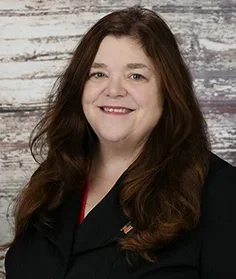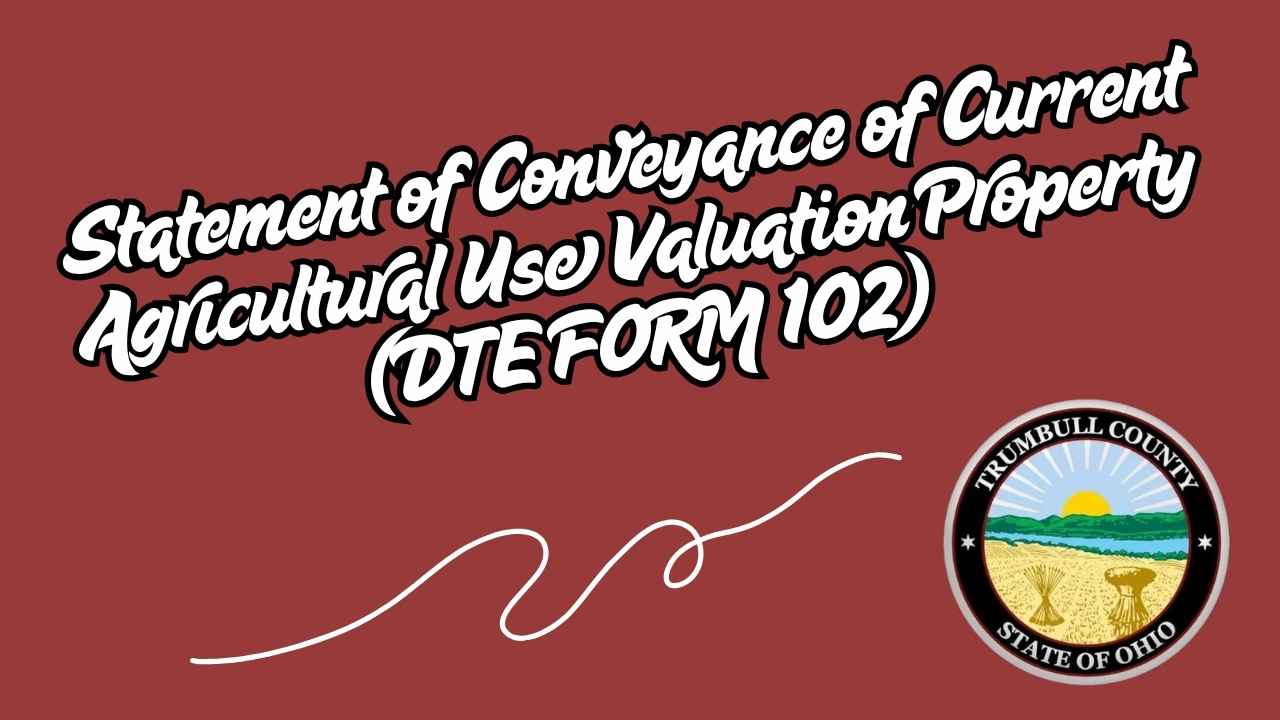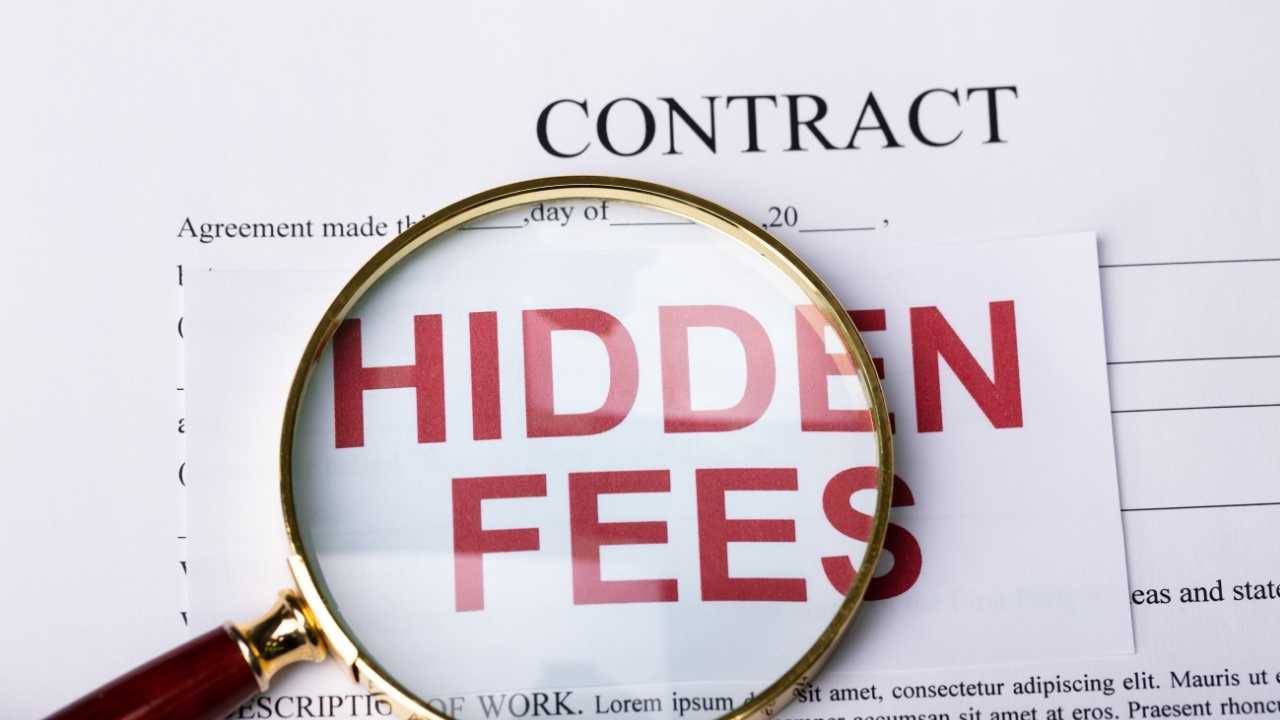The Statement of Conveyance of Current Agricultural Use Valuation Property (DTE Form 102) is a legal document needed in Trumbull County, Ohio. It’s used when transferring property in the Current Agricultural Use Valuation (CAUV) program. This form makes sure the new owner knows about the property’s CAUV status and any tax charges if the land isn’t used for farming.
It must be filed with the Trumbull County Auditor’s Office during property transfers. This keeps tax records up to date.
What is the CAUV Program in Trumbull County?
The CAUV program in Ohio lets qualifying agricultural land be taxed at a lower rate. This is based on its agricultural use value, not its market value. It helps farmers in Trumbull County save on property taxes.
To qualify, the land must be used for commercial farming. This includes growing crops or raising livestock.
Eligible land must be at least 10 acres or make $2,500 a year from farming over three years. The land must be used only for farming. The CAUV program has helped Ohio farmers for over 45 years by lowering their taxes.
Why is DTE Form 102 Important?
The DTE Form 102 is key when transferring CAUV-enrolled property in Trumbull County. It tells the buyer about the property’s CAUV status. If the new owner doesn’t farm the land, they might face a tax charge for past savings.
This form makes sure both the seller and buyer are clear. It must be attached to forms like DTE 100 or DTE 100EX when filing with the Trumbull County Auditor. The county auditor checks the form to make sure it follows Ohio laws.
Who Needs to File DTE Form 102?
Anyone buying or selling property in the CAUV program in Trumbull County needs to file DTE Form 102. This includes:
- Sellers (Grantors): They must say the property is in the CAUV program.
- Buyers (Grantees): They must know the CAUV status and any tax charges.
- County Auditor: They check and approve the form to update tax records.
The form needs a signature from the grantor or their representative and a notary stamp. It’s then sent to the Trumbull County Auditor’s Office at 160 High Street NW, Warren, Ohio 44481.
When Should You File DTE Form 102?
DTE Form 102 is needed when a CAUV-enrolled property is sold. This includes:
- Selling agricultural land.
- Transferring property through a deed (like a warranty or quitclaim deed).
- Changes in ownership, like inheritance or gifting.
The form should be filed with the county auditor before the deed is recorded. It’s best to file as soon as the sale starts.
How to Complete DTE Form 102
Filling out DTE Form 102 is easy but needs careful attention. Here’s how to do it:
- Enter Grantor and Grantee Information: Include the names and addresses of the seller (grantor) and buyer (grantee).
- Provide Parcel or Account Number: List the property’s parcel or account number from the Trumbull County Auditor’s records.
- Confirm CAUV Status: State that the property qualified for CAUV in the current or prior tax year.
- Acknowledge Recoupment Charges: Note that the grantee is aware of possible tax recoupment if the land is no longer used for agriculture.
- Sign and Notarize: The grantor or their representative must sign the form in the presence of a notary public.
- Submit to Auditor: Present the form to the Trumbull County Auditor’s Office with the conveyance fee forms.
The auditor will endorse the form and send it to the grantee or their representative. A copy is also given to the grantor to confirm delivery.
What Happens If You Don’t File DTE Form 102?
Not filing DTE Form 102 during a CAUV property transfer can cause problems, such as:
- Delayed Property Transfer: The auditor may not process the deed without the form.
- Unexpected Tax Liabilities: The buyer may face recoupment charges without prior knowledge.
- Non-Compliance Penalties: The transfer may violate Ohio Revised Code requirements.
To avoid these issues, make sure the form is completed and submitted on time during the transfer process.
CAUV Tax Savings and Recoupment
The CAUV program lowers property taxes by valuing land based on its agricultural productivity, not market value. For example, a 50-acre farm in Trumbull County might have a market value of $500,000 but a CAUV value of $50,000. Taxes are calculated on 35% of the CAUV value, significantly lowering the tax bill.
If the land is removed from the CAUV program (e.g., converted to non-agricultural use), the owner must pay a recoupment charge. This charge equals the tax savings from the previous three years. The DTE Form 102 ensures the buyer is aware of this possible cost before finalizing the purchase.
Example of CAUV Tax Savings vs. Market Value
| Property Type | Market Value | CAUV Value | Taxable Value (35%) | Estimated Annual Tax (2% rate) |
|---|---|---|---|---|
| 50-Acre Farm | $500,000 | $50,000 | $17,500 | $350 |
| Non-CAUV Land | $500,000 | N/A | $175,000 | $3,500 |
Note: Tax rates and values are illustrative and vary by location and soil type.
How CAUV Values Are Determined
CAUV values in Trumbull County are set by the Ohio Department of Taxation. They consider:
- Soil Type: Different soils have varying productivity levels.
- Soil Region: Trumbull County’s soil regions affect valuation.
- Land Capability Class: This measures the land’s suitability for agriculture.
- Agricultural Commodity Prices: Prices for crops like corn or soybeans influence CAUV values.
These values are updated every three years. This reflects changes in agricultural production costs and commodity prices. The Trumbull County Auditor’s Office ensures soil values align with state guidelines under ORC 5713.31.
Steps to Apply for CAUV in Trumbull County
If you’re purchasing land and want to enroll it in the CAUV program, follow these steps:
- Verify Eligibility: Ensure the land is at least 10 acres or generates $2,500 in annual agricultural income.
- Complete DTE Form 109: Submit the initial CAUV application between the first Monday in January and the first Monday in March.
- Pay Application Fee: The initial fee is $25; renewals are free.
- File Annually: Submit a renewal application (DTE Form 109A) each year to continue receiving CAUV benefits.
- Submit to Auditor: File applications at the Trumbull County Auditor’s Office.
Applications are available on the Trumbull County Auditor’s website or at their office in Warren, Ohio.
Common Uses of CAUV Land in Trumbull County
Land enrolled in the CAUV program can be used for various commercial agricultural activities, including:
- Growing field crops like corn, soybeans, or wheat.
- Raising livestock such as cattle, poultry, or pigs.
- Producing timber for commercial purposes.
- Operating apiaries for honey production.
- Growing fruits, vegetables, or nursery stock.
The land must be devoted exclusively to these activities to maintain CAUV status.
Conveyance Fees in Trumbull County
When transferring CAUV property, you’ll need to pay conveyance fees. In Trumbull County, these fees are:
- $4 per $1,000 of the property’s consideration (rounded up to the nearest $100).
- $0.50 per parcel for the transfer fee.
- Exempt transfers cost $0.50 per parcel.
For example, transferring a $100,000 CAUV property with one parcel would cost $400 in conveyance fees plus $0.50 for the transfer fee. These fees are collected by the Trumbull County Auditor’s Office under ORC 319.20 and 322.02.
Conveyance Fee Examples in Trumbull County
| Property Value | Conveyance Fee ($4/$1,000) | Transfer Fee ($0.50/parcel) | Total Fee |
|---|---|---|---|
| $100,000 (1 parcel) | $400 | $0.50 | $400.50 |
| $250,000 (2 parcels) | $1,000 | $1.00 | $1,001.00 |
| Exempt (1 parcel) | $0 | $0.50 | $0.50 |
Note: Fees are subject to change; confirm with the Trumbull County Auditor’s Office.
Where to Find DTE Form 102
You can get DTE Form 102 from:
- Trumbull County Auditor’s Office: At 160 High Street NW, Warren, Ohio 44481.
- Online: Download it from the Trumbull County Auditor’s website or other Ohio county auditor sites like Geauga or Portage County.
- Third-Party Sites: Sites like Deeds.com or formupack.com have it for download. Just make sure it meets Trumbull County’s standards.
Always check if the form is the latest version. The newest ones are labeled “Rev 8/09” or later.
Tips for a Smooth Property Transfer
To make transferring CAUV property in Trumbull County easy, follow these tips:
- Work with a Professional: Get help from an attorney or real estate agent who knows Ohio’s CAUV program.
- Double-Check Forms: Make sure DTE Form 102 and other forms are filled out and notarized correctly.
- Understand Recoupment Risks: Talk about possible tax charges with the buyer before closing.
- Submit Early: File your forms with the auditor’s office as soon as you can to avoid delays.
- Keep Records: Keep copies of all documents, including the endorsed DTE Form 102.
How the Auditor’s Office Processes DTE Form 102
After you submit it, the Trumbull County Auditor’s Office checks DTE Form 102 to:
- Check if the property is CAUV eligible.
- Make sure it follows Ohio Revised Code sections 5713.30 and 5713.34.
- Sign the form and update tax records.
- Send the signed form to the buyer or their representative.
The auditor also makes sure the seller gets a copy of the signed form. This keeps property ownership and tax records up to date in Trumbull County.
CAUV vs. Other Ohio Tax Programs
Trumbull County has other tax programs that might affect property transfers, like:
- Homestead Exemption: It lowers taxes for homeowners who qualify (DTE Form 101).
- Owner-Occupancy Reduction: It reduces taxes for homes owned by the occupants.
- Ohio Forestry Tax Law (OFTL): It offers tax benefits for forested land.
These programs are different from CAUV. For example, the Homestead Exemption needs a separate DTE Form 101, while CAUV uses DTE Form 102 for transfers.
Common Questions About DTE Form 102
Here are answers to frequently asked questions:
- Do I need a lawyer to file DTE Form 102? No, but consulting one can help avoid errors.
- What if the property is no longer agricultural? The buyer may face recoupment charges for prior tax savings.
- Can I file DTE Form 102 online? Check with the Trumbull County Auditor’s Office for electronic filing options.
- Is there a fee for DTE Form 102? No, but conveyance fees apply to the property transfer.
For specific questions, contact the Trumbull County Auditor’s Office at 330-675-2420.
Why CAUV Matters for Trumbull County Farmers
The CAUV program helps Trumbull County farmers by lowering property taxes. This lets farmers invest more in their farms. By filing DTE Form 102, farmers ensure new owners know about the program.
This program also keeps farmland from being turned into non-agricultural land. In Trumbull County, where farming is important, CAUV helps keep rural areas and supports local food.
Maintaining CAUV Status After Transfer
To keep CAUV benefits after buying a property, the new owner must:
- Continue using the land for commercial agriculture.
- File a CAUV renewal application (DTE Form 109A) annually.
- Report any changes in land use to the Trumbull County Auditor’s Office.
Not keeping CAUV status may lead to higher taxes and recoupment charges.
Additional Resources for Trumbull County Property Owners
For more information on DTE Form 102 and the CAUV program, explore these resources:
- Trumbull County Auditor’s Website: Offers forms, FAQs, and contact details.
- Ohio Department of Taxation: Provides CAUV guidelines and updates.
- Local Extension Office: Offers agricultural advice for Trumbull County farmers.
These resources can help you understand the CAUV program and property transfers.
Conclusion
The Statement of Conveyance of Current Agricultural Use Valuation Property (DTE Form 102) is key for transferring CAUV land in Trumbull County, Ohio. By filing this form, sellers and buyers make sure the property’s tax status is clear.
Knowing about the CAUV program and DTE Form 102 helps farmers and landowners make smart choices, supporting Trumbull County’s farming tradition.
For help, visit the Trumbull County Auditor’s Office or their website. Properly filing DTE Form 102 ensures a smooth transfer and keeps tax savings for qualifying agricultural land.




